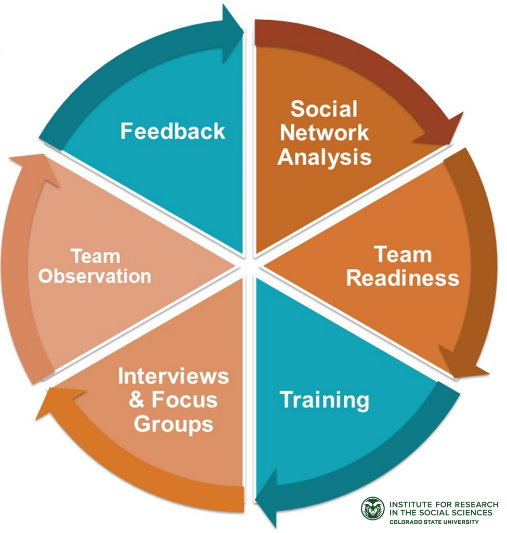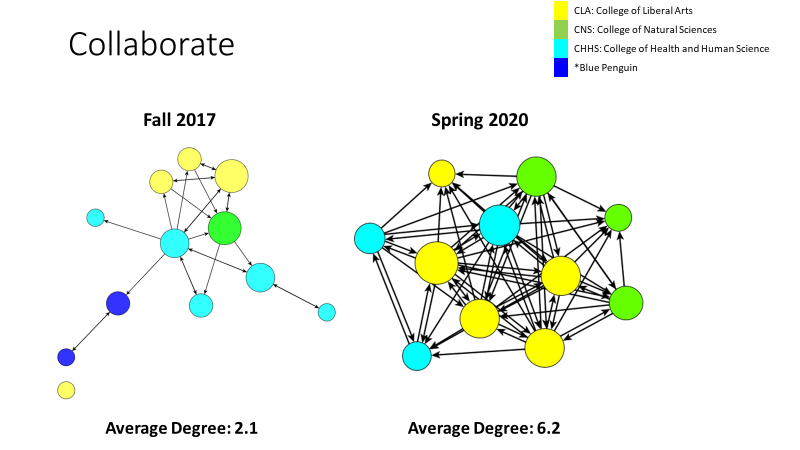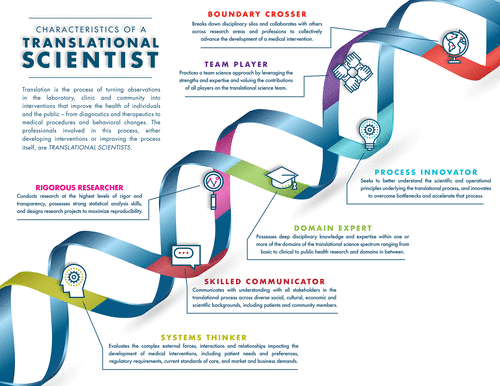Science of Team Science
Scientific research is increasingly being conducted by diverse teams with team members crossing disciplinary, geographic, and institutional barriers.
WHY? The shift in scientific teams, towards larger and more diverse teams, is due in part to the complexity of problems that scientists are being asked to solve. To solve many of the “wicked problems” and complex problems now facing our world such as climate change, violent crime, or water shortages, scientists will need to work in an interdisciplinary fashion to combine and transform knowledge. However, working in a team to combine scientific knowledge across disciplines presents many challenges.
As team science becomes more prevalent, how we can develop, coach, train, and assess teams in order to create the greatest likelihood for successful teams?
Characteristics of a Translational Scientist:
Translational and transdisciplinary scientists are innovative and collaborative, searching for ways to break down barriers in the discovery and translation process and ultimately deliver solutions to complex problems more quickly. The Fundamental Characteristics of a Translational Scientist illustrates the breadth of skills required that go beyond depth of knowledge in a field and rigourous research skills (Gilliland et al. 2019)1.
Translational scientists discover, develop, and disseminate science and technology solutions to improve human, animal, and ecological health and well-being. They work in collaboration with community members and organizations across the process from discovery to dissemination.
Team Science Training:
Teaming for Early Career Scientists
Who: pre and postdoctoral scholars, and early career researchers
What: This curriculum is designed to build your capacity to participate in and lead interdisciplinary and translation scientific teams. It addresses the shift in science from an individual-based approach to a teamwork model of conducting clinical and translational research. The program consists of completion of a self-paced online course followed by participation in six virtual workshops, which are each 2 hours in duration.
Time: 14 hours
Teaming 101. Online Course: This online, self-paced course includes several modules (8-12 minutes each) introducing you to the scientific literature on teams and team performance. It provides the background knowledge that will help you get the most out of the interactive workshops.
Workshop 1. Building Relationships and a Team: It’s not who is on your team, but how your team interacts that best predicts team performance and creativity. In this workshop, you will enhance your self-awareness, discover new tools for improving team meetings, and practice skills for team interaction.
Workshop 2. Setting Expectations on a Team: The best teams capitalize on the unique strengths of each team member and provide clarity on roles and expectations, so team members know how to perform to expectations. This workshop will prepare you to determine necessary and unfulfilled roles on your teams, explore examples of team documents (e.g. team charters, lab polices and communication plans), and develop a list of documents that could help improve one of your teams.
Workshop 3. Building a Shared Language & Vision: The more diverse our teams are, the more we need to develop new skills to engage diverse team members in collaborative dialog. In this workshop you will identify the beliefs and values of unique disciplines, identify strategies for building a positive communication culture, and practice the co-construction a team vision.
Workshop 4. Collaborative Knowledge Creation: Sometime group brainstorming is fun and sometimes it is downright painful. Learn how to make collaborative problem-solving fun and productive. In this workshop you’ll explore online tools to support virtual collaboration, complete a fun brainstorming session, and devise an action plan supporting your team’s collaborative creativity.
Workshop 5. Change Management, Negotiation, and Conflict Resolution: How can you help your team adjust to change, integrate new members, and resolve conflicts? In this workshop, you’ll exercise negotiation skills, formulate a team skills and roles map, and practice a conflict resolution scenario.
Workshop 6. Leadership for All Team Members: Leadership is not just for PIs, it is a role that any member of a team enact. Practice switching between four essential roles on a team, develop a plan for team members to contribute their greatest strengths, and build a peer mentoring plan.
Who: PI’s and scientists leading teams
What: This training focuses on the competencies for team management, collaborative leadership, and cultivating a strong team culture. Delivered as a series of two-hour, interactive workshops, these trainings are customized to meet the needs of scientific leaders and build their skills in developing teams with high levels of trust, psychological safety, and performance. Topics can include: creating shared vision, group norms and expectations, roles & responsiblities, collaborative leadership practices, strategies to reduce collaborative overload, communication plans, and other key team science best practices.
Time: 4-12 hours
“I loved this training! I wish I had been introduced to these ideas 17 years ago when I started grad school. It would have saved a lot of headaches. I’m eager to work on implementing them.” -Virginia Rich, The Ohio State University, EMERGE Biology Integration Institute
Who: all scientists who want to address JEDI issues in their teams or organizations
What: We are in the midst of an awakening, that our global environmental, economic, and public health problems are deeply entwined with enduring legacies of inequality and oppression. Solving complex scientific problems requires that we address JEDI concerns as integral to our science and problem-solving endeavors, as well as our team-building efforts. This workshop will explore best practices from teaming, intercultural literacy, and social justice research. It will explore unique definitions of each concept, Justice, Equity, Diversity, and Inclusion, and explore powerful habits that can be adopted by any team or organization to address these issues internally and in partnership with others.
Time: 2-8 hours
Workshops for Existing and Emerging Teams:
Who: emerging and existing teams
What: This workshop is designed to bring together a diverse team to co-create a team vision. In these workshops we need a diverse group of scientists through a series of activities to generate and refine a shared vision. Using the latest tools from creativity science and deliberative decision-making, we guide teams in the co-creation process. These workshops are liberating for team leaders by freeing them to listen and participate fulling in the co-creation process. These workshops are ideal for the grant development phase, team launch after receiving funding, or resetting after a substantial change in direction or team membership.
Time: variable, 4 hours to mutli-day
Who: existing teams
What: Teams from varying disciplines need to build a shared language and their capacity to converse across differences. This workshop guides teams through a structured dialog to uncover differences and similarities in assumptions, values and approches to science. In a fun and engagign forum, teams will discuss expand their capacity to talk across discipplines, coordinate complex activities, and more rapidly achieve their goals.
Time: 3-4 hours
Who: whole teams or groups that need to combine and innovate new knowledge
What: Want to combine knowledge in new and interesting ways but you don’t know how? Is your team having trouble working through a tough part of their research? Scientific research on collaborative decision-making and creativity have identified several processes used to find creative solutions. These workshops are custom-designed to meet the needs of your team and build your capacity for participating in and leading creative problem-solving sessions. Be prepared to have fun and move your thinking to the next level.
Time: varies, 4 hours to multi-day
Who: existing and emerging teams
What: Large transdisciplinary teams benefit from annual retreats where team members are able to gather as a full team, build social relationships, share progress from the past year, and plan for the upcoming year. We work with team leaders to co-create an agenda which can maximize the opportunity for all member of the team to acvitely participate. These retreats are designed to support team leaders by taking the burden of faciltation off your shoulders, allowing you to fully participate, listen, and engage with the team, without the worry about timelines, agendas, etc. We free you up to enjoy the ride!
Time: 1-3 days
Team Development and Evaluation:
Developmental Evaluation
Are you interesting in tracking how your team grows and develops over time? The goal of team evalution is to enhance the capacity of teams to collaborate and self-evolve. We use a mixture of social network analysis, surveys, and team observations to create customized network diagrams and recommendations on strengths and weaknesses of a team
Teaming workshops, trainings, and other interventions are designed to build on existing team strengths and enhance the productivity of your team.
We use mixed methods to assess teams and predict performance:
- Individual collaboration readiness
- Team readiness
- Network growth
- Team trust and psychological safety
- Collaborative capacity



Jeni E. Cross, PhD Professor of Sociology; Director, Institute for Research in the Social Sciences
For Training Requests please visit: https://iriss.colostate.edu/services/
1Gilliland CT, White J, Gee B, Kreeftmeijer-Vegter R, Bietrix F, Ussi AE, et al. The fundamental characteristics of a translational scientist. ACS Pharmacol Transl Sci. 2019;2(3):213–6.
